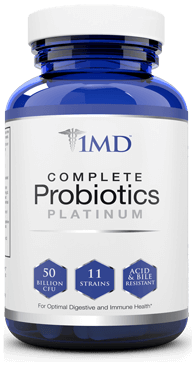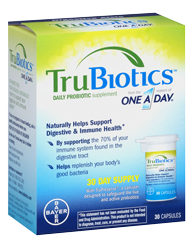- Jump to:
- Why is our microbiome important, anyway?
- What Not to do when buying a Probiotic
- The 3 Secrets of A High Quality Probiotic
- Top 5 Probiotic Supplements of 2018
For the last several years, probiotics have been the health supplement making waves in the news — doctors and celebrities alike have all been toting its amazing, gut-transforming benefits.
But how do you know if probiotics are the right fit for your health?
It might be time to consider taking a probiotic if you’ve ever experienced:
Uncomfortable bloating after a meal
Trouble with digestion
Gas
Irritable bowel syndrome (IBS)
Brain fog or trouble focusing
Fatigue
All these symptoms may be signs that the bad bacteria in your gut is taking over and wreaking havoc on your overall health.
That’s because your microbiome (the community of bacteria in your gut and body), controls a lot more than you think. Numerous studies have linked a healthy microbiome, that’s populated with good bacteria, to a multitude of other benefits, like improved cognitive function, a stronger immune system, and more radiant skin.
WHAT EXACTLY IS YOUR MICROBIOME AND WHY IS IT IMPORTANT?
Your microbiome, simply put, is the an ecosystem of microbes, which is a general term that encompasses bacteria, archaea, protists, and other microscopic organisms living in your body.
In fact, your microbiome is so far reaching, that 90% of the cells in your body are microbial, and a majority of them live in your digestive system. So keeping your gut balanced and populated with the good kind of bacteria, can help your entire body function at its optimal level.
However, most of us will feel symptoms of a poorly functioning gut, like fatigue, bloating, or gas and write it off as something temporary, or even worse — ignore these signs all together.
10 ways you're hurting your gut bacteria
Our modern Western society has adopted unhealthy activities and lifestyles that affect our microbes in a variety of ways. Most are difficult — if not impossible — to avoid, but it's critical to spread awareness if we want to protect our microbiome.
- Sweets. Processed sugars can feed potentially unhealthy bacteria
- Wine and beer. Alcohol consumption can alter your microbial balance.1
- Poor sleep. This can lead to subtle changes in your microbial makeup.2
- Antibiotics. These kill both good and bad bacteria.
- Not enough fiber. It serves as food for helpful microbes.
- Living in the city. Pollution can affect the number of good bacteria.3
- Water containing chlorine. Chlorine can kill both good and bad bacteria.
- Foods with artificial coloring. These are antibacterial and antifungal.
- Antibacterial soaps. Any antibacterial products can destroy healthy microbes.
- NSAID pain relievers. They disrupt digestive flora and intestinal mucus.4
If any of these apply to you, it may be time to look for a high quality probiotic. Unfortunately, sometimes it's difficult to know where to start, and many of our Smarter Shoppers reported regretting their first probiotic purchase. With this in mind, we included a section to help you skip their mistakes:
What Not to do when buying a Probiotic
Forget the Research
Many shoppers believe that it doesn't matter which probiotic they choose. This is not the case. Many supplements contain ineffective and potentially harmful additives, such as artificial fillers and colors. Binders, including magnesium stearate, chromium, gelatin, and silicon dioxide, are other infamous additives to avoid.
Rely on Amazon Reviews
Millions of Americans look to Amazon reviews before purchasing their products, but most don’t realize that up to 60% have been paid for. Some disreputable, fly-by-night companies compensate individuals for positive reviews, regardless of whether they've tried the product or not. Risking your health with reviews that are likely false is too dangerous a game to play when you’re choosing an ingestible supplement.
Prioritize Price Over Quality
We found that many lower-priced and generic probiotic supplements only contain one strain, and even worse, don't list substrains. Many of these companies also offer confusing guarantees that seem like a good deal at the time, but ultimately only hurt your wallet. Try to find a probiotic with the qualities listed below, even if that means they cost a little more than your local grocery store's generic brand.
What You Should Look for in a Good Probiotic
Based on our research and feedback from our Smarter Shoppers, these are the things to look for in an exceptional probiotic supplement:
Formulated by A doctor
It takes specific expertise to form an effective probiotic formulation. More is not necessarily better. The exact combination of strain type, quantity and prebiotics determines the product's quality. Look for real doctors specializing in gut health backing the product.
High CFU Count
Since our microbiome is composed of about 100-trillion good and bad bacteria, a high number of CFUs will have greater impact on the growth of beneficial bacteria within your gut flora. Look for a formula with a minimum of 40 billion CFUs
Multiple Strains
Taking a probiotic with a variety of good bacteria strains can help balance your microbiome. Unfortunately, most probiotic supplements only provide one type of strain. That's why it's crucial to find probiotics that use a comprehensive approach to promoting balance in your gut bacteria.
Try to find a supplement with at least 9 individual strains.
Focusing on the qualities above is a good start, but to find the best probiotics on the market, we suggest adding these little-known secrets to your research regimen.
The 3 Secrets of A High Quality Probiotic
it Lists Its SubStrains
The substrains listed next to each strain indicates that a specific probiotic strain has undergone clinical studies. Many probiotic formulations do not list their specific substrains. This is a huge red flag that suggests they may be using generic (and cheaper) substrains that have not been clinically studied.
It contains Prebiotics
The latest research shows using fiber-based prebiotics (such as NutraFlora Fiber) will help the probiotics populate and flourish in your gut. This will significantly increase the overall effectiveness of the probiotic.
It doesn't require Refrigeration
Refrigerated products can be damaged during shipping. Another note: you're not always going to have access to a refrigerator, so we suggest choosing a probiotic that is well-formulated to withstand room temperature and does not require being refrigerated during periods of non-use.
Our specialized ranking system
At Smarter Reviews, we employ a comprehensive evaluation system to analyze and measure the full value of products, by looking at the ingredients, clinical studies, safety, projected effectiveness, return policies, and overall customer satisfaction. This method is known as the Smarter Reviews Ranking System.
Top 5 Probiotic Supplements of 2019
We've compiled a list of what we've found to be the top five products in
this category, on the market today.

.png)








